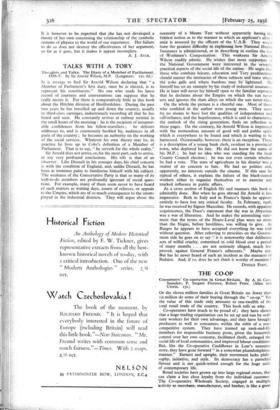TALKS WITH A TORY
Thoughts and Talks. The Diary of a Member of Parliament, 1935-7. By Sir Arnold Wilson, M.P. (Longmans. I2S. 6d.) IT is strange to find Sir Arnold Wilson declaring that " a Member of Parliament's first duty, once he is elected, is to represent his constituents." No one who reads his latest record of journeys and conversations can suppose that he really means it. For ,there is comparatively little in this book about the Hitchin division of Hertfordshire. During the past two years he has travelled up and down the country, usually in third-class carriages, industriously recording all that he has heard and seen. He constantly arrives at railway termini in the small hours of the morning : he is the recipient of hummer- able confidences from his fellow-travellers ; he delivers addresses to, and is courteously heckled by, audiences in all parts of the country ; he becomes an authority on the working of the social services. Whatever his own theory may be, in practice he lives up to Coke's definition of a Member of Parliament. That is to say, " he serveth for- the whole realm."
Sir Arnold does not arrive, or, for the most part, seek to arrive, at any very profound conclusions. His role is that of an observer. Like Disraeli in his younger days, his chief concern is with the condition of England, and, unlike Disraeli, he has been at immense pains to familiarise himself with his subject. The weakness of the Conservative Party is that so many of its well-to-do members are profoundly ignorant of social ques- tions. For example, many of them seem never to have heard of such matters as waiting days, courts of referees, or appeals to the Umpire, which are of so much consequence to the unem- ployed in the industrial districts. They will argue about the .- necessity' of - Means - 'Fest without apparently having the faintest notion as to the manner in which an applicant's allow- ance is assessed by the officers of the U.A.B. -They would haVe the greatest difficulty in. explaining-how-National Health Insitrance is administered, or .in describing in outline the law of- -Worletnen's Compensation: -This weakness -Sir -Arnold Wilsbn-readily admits. ,_,-e,:viisheS that more, supporters of the -Nationat Government were interested .'in the 'severely practical_ ispects, of the. sociallife of. the .nation. -- He urges, that those who combine leisure, education 'and Tory predilections should -master the intricacies of those subjects and learn where the---Yoke - galls and Where -burdens =may tie-lightened..- • He himself has set_an example by his_studY,Of industrial assurance. He at least-Will never-lay hiniself open to the familiar reproach that . he declaims about the Empire on which the sun never sets and ignores the slum alleys on which the sun never rises.
On the whole the picture is a cheerful one. Most of those whir; confided in the author were young men. They seem by, no means to have lost the qualities of independence and seff4eliance, and the hopelessness, which is said to characterise the outlook of the rising generation, finds no reflection in these pages. On the contrary, Sir Arnold Wilson is impressed with the tremendous amount of good will and public spirit which is everywhere to be found and which is waiting to be harnessed. Occasionally, however, there is an exception. There is a description of a young bank clerk, resident in a provincial town, who deplored his fate. - He did not know the name of his M.P. ; he had no idea who was standing for the local County Council election ; he was not even certain whether he had a vote. The state of agriculture in his district was a matter of no concern to him: He had no politics and, apparently, no interests outside the cinema. If this case be typical of others, it explains the failure of the black-coated workers either to organise themselves or to exercise any marked influence in public affairs.
As a cross section of English life and manners this book is admirably done. But when he. goes abroad Sir Arnold is less impressive. Both in Italy and in :Franco's Spain. he appears entirely to have lost any critical faculty. In February, 1936; he was received by Signor Mussolini. He records, with apparent acquiescence, the Duce's statement that the war in Abyssinia was a war of liberation. -And he inakei the astonishing state- ment that the terms. of the Hoare-Laval plan were no more than the Negus, - before `hostilities, was willing to give. At Burgos he appears to have accepted everything he was told without question. After referring to atrocities on the Govern- ment side he goes on to say it is noteworthy that deliberate acts of wilful crtielty, committed in' cold blood over a period of many months . . are not seriously alleged,. much less proved, against General Franco's adherenti." Maybe not. But has he never heard of such an incident as the massacre of Badajoz. And, if so, does he not think it worthy of mention ?
DINGLE FOOT.
















































 Previous page
Previous page